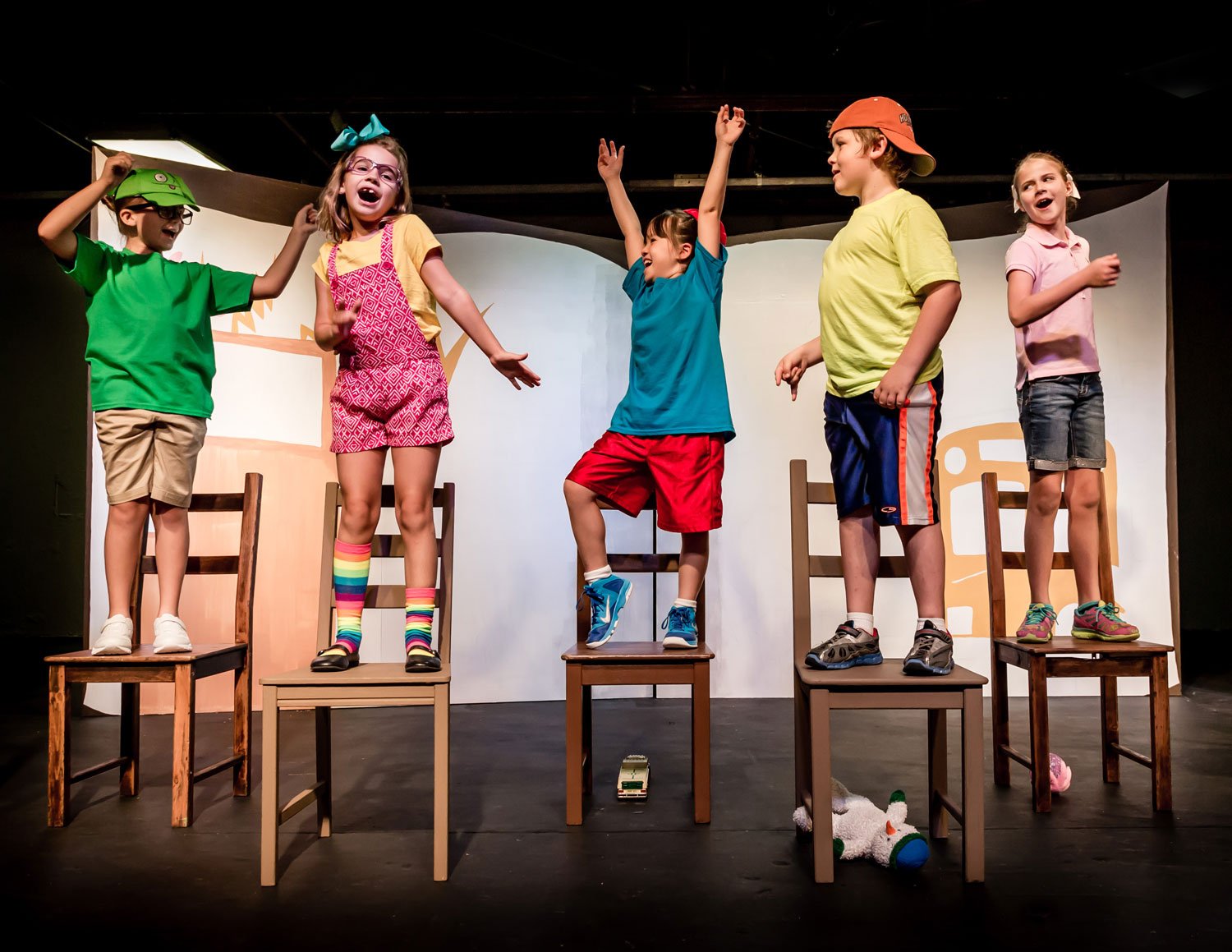10 Unexpected AMAZING Benefits of Children Performing in Theatre
(Photo: Plano Children’s Theatre)
by Angela Capps, Guest Editorial
As a theatre teacher and director, I’ve realized some exceptional perks for children (and their parents) involved in theatre! Here are some priceless benefits:
Patience and Respect. Standing quietly backstage is no easy task, especially for children full of butterflies and heart flutters. They wait patiently, in anticipation for their turn on stage, and discover that it’s respectful to remain quiet as they don’t want to distract the actors who are on stage.
Naturally, some children do need repetitive reminders to mute their excitement, but when they do, it’s a huge accomplishment! Children having fun while being patient and respectful is a beautiful sight!
Facing your fears. It’s a surprising fact, yet hauntingly true: most people fear public speaking more than death. Fear of rejection is simply part of life, yet it’s manageable and can be very rewarding for those who learn to face this fear.
Theatre allows children to face a crowd, speak in front of them, sing a song or two, and perhaps even make them laugh. Because they are children, they are embraced by a supportive audience that giggles, applauds, and encourages them.
A child can forget a line or two and still be unconditionally loved by their audience. The hope is that a comfort level is being established within them and tools are being learned so they can have a healthy, lifelong relationship with facing the crowd. Applause!
Be yourself. In the theatre, there’s a place for everyone. There is hardly anyone too eccentric or too out there to be in the theatre. Uniqueness is embraced, and I’ve never seen a child excluded from companionship among theatre kids. Even a child who chooses to be a loner is treated with acceptance.
Quite frankly, the freedom to be oneself, especially for a child, is thrilling and can be a place of comfort for kids who feel like they don’t quite fit in.
Flamboyant and loud personality? Great! Can you think of another extracurricular activity where children are encouraged to be over the top and speak with lots of volume? Many times during play rehearsals, I ask the children to speak louder! Be big, and you will be rewarded with applause and laughter! Theatre gives the energetic performer a platform to let go and be free, which can be exhilarating.
While children are usually reminded to be quiet, theatre gives them an outlet. I’ve seen happiness spill out of children when they are allowed to be big and loud, and it’s captivating.
Responsibility. Children learn early in rehearsals that knowing their lines is valuable. It can be embarrassing and negatively affect the rehearsal flow when they don't take responsibility for their part. They become part of a team, and everyone is counting on one another to be prepared.
Although this push into responsibility may be difficult and involve hard work, it’s an incredible lifelong lesson and tool.
Adios technology! So, while technically, there are lights, sound effects, microphones, and speakers, children have nothing to do with these technical aspects. Thankfully, they are experiencing old-fashioned human interaction while enriching their social skills! In addition to interacting with each other, their teachers, and directors, there is a live audience.
In addition, there is the common rule of no phones or video games backstage or at rehearsals, which deserves a standing ovation.
Short attention span: no more! Television has become the most popular form of entertainment, and why wouldn’t it? Children see a new image every 3 to 4 seconds while watching T.V. Also, the obsession with video games and social media additionally inhibits a child’s focus. Satisfyingly, while doing a play, children are focused for over an hour. In fact, studies show that participating in theatre has the potential to lengthen attention span permanently.
Happy Theatre Teachers. Generally, a theatre instructor/director doesn’t just fall into the position; they chase it and catch it with a celebratory cheer and a sigh. For any teacher and or actor, it’s a privilege to teach children’s theatre. It’s a safe assumption that your child is being coached and directed by teachers who are thrilled to be doing what they are doing.
Theatre can be a cozy place for many children, with teachers who care and are enthusiastic about each child’s unique talents.
Improves Education. It’s no secret, as any research-savvy parent can find, that children who participate in the arts do better academically and have higher test scores. The number of longitudinal studies is astounding and quite clear: the arts are vital to the developing brain.
While theatre may seem difficult to fit into a child’s already busy schedule, it’s a valuable option that usually lasts just a few months and can really make a difference.
Reading and Language. Texting is not exactly the most artful and educated communication. Constant abbreviations and slang terms don’t necessarily glorify the beauty of language. Reading books and studying words doesn’t seem to grip children with excitement anymore. Today, children have a million other entertaining options at their fingertips.
The great news is that performing in a play involves reading and memorizing lines, and many of these lines contain unique language!
If you’re not already, please consider getting your kids involved in theatre. You won’t regret it!
